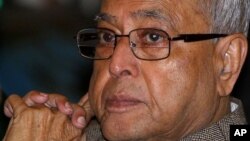Indian economic officials are consulting with their counterparts in other emerging countries to try to reach consensus about whom to nominate for the top job at the International Monetary Fund. India and other developing countries may challenge the seven-decade old custom of having a European at the helm of the powerful financial institution.
Finance Minister Pranab Mukherjee says he is in touch with his counterparts in other developing countries to consolidate a position regarding the post of Managing Director at the International Monetary Fund.
The frontrunner for the post is French Finance Minister Christine Lagarde who has put in her bid for the job. The position has always gone to a European, but emerging nations have criticized that practice as obsolete.
Earlier this week, IMF officials from India, Brazil, China, Russia and South Africa issued a joint statement saying using nationality as a criteria for the job undermines the legitimacy of the fund.
However so far they have failed to name a common candidate.
In a meeting with Lagarde in Paris Thursday, Indian Commerce Minister Anand Sharma said the selection process should be consultative and transparent.
Economist S.L. Rao, with the Institute for Social and Economic Change in Bangalore, says countries like India, China, Brazil and South Africa are determined to push for more decision-making power at the IMF and the World Bank.
“The whole balance of economic power is beginning to change…I think these are countries that now carry a substantial amount of economic clout and they should really have a considerably larger say than they do today in the financial institutions of the world,” said Rao.
The statement earlier this week from the emerging economies said that the choice of the IMF chief should be based on competence, not nationality.
Economist Rao says this reflects their view that emerging economies coped better with the global financial crisis compared to other countries.
“The finance minister from India has managed its economy extraordinarily well, so has China," Rao said. "And I think, Europe, United States, Britain, have not demonstrated the same kind of competence. If they could not manage their own countries well, why do they think they can manage the global financial institutions?”
India’s representative to the IMF has said any bid by emerging countries to put up their own candidate for the top job is unlikely to succeed. Mexico has nominated its central bank governor Agustin Carstens for the job.
However, observers say these countries are determined to push for overhaul of the governance of these institutions.
Some change did take place last year when emerging economies were given six per cent more voting share at the IMF. But officials in India felt that this did not go far enough. The United States and European nations hold about half of the votes in the IMF mainly because of the relative size of their economies.
Responding to the ongoing debate on the IMF chief’s selection, Indian Prime Minister Manmohan Singh said this week during a visit to Africa that reform of global institutions is high on the agenda of many developing countries, but could take time.
“But we have also to recognize that international relations beyond a point are power relations and that those who wield power do not wish to yield ground very easily," said Rao. "I do recognize that the struggle for the transformation of global institutions including the Breton Woods institutions is not a one-shot operation. It is a long process, in which all the developing countries will have to stand united.”
Besides the IMF, India has also been pushing for reforms at the United Nations, and asking for a permanent seat in the Security Council.
The post of IMF chief became open when Managing Director Dominique Strauss-Kahn resigned after his arrest in New York on charges of sexual assault.
India Consulting With Other Emerging Countries on IMF Top Job




